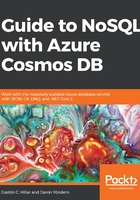
What this book covers
Chapter 1, Introduction to NoSQL in Cosmos DB, introduces you to the features of Cosmos DB and the NoSQL data model. You will also learn about the different elements of the Cosmos DB resource model, which will allow you to have a clear understanding of how to work with this database service.
Chapter 2, Getting Started with Cosmos DB Development and NoSQL Document Databases, will teach you how to provision a Cosmos DB account that uses the SQL API, and you will start working with a document database, along with its collections and documents. You will use the web-based Azure portal and work with Azure Cosmos DB Explorer.
Chapter 3, Writing and Running Queries on NoSQL Document Databases, will have you writing and running queries to retrieve data from the documents in a collection. You will learn how to use the Cosmos DB dialect of SQL to work against a document database with the SQL API. Most importantly, you will understand the different ways of working with documents, their sub-documents, and their arrays, and you will learn about how queries consume resource units.
Chapter 4, Building an Application with C#, Cosmos DB, a NoSQL Document Database, and the SQL API, will get you using Cosmos DB, the .NET Core SDK, the SQL API, and C# to code our first Cosmos DB application. The main focus will be on learning about many important aspects related to the SDK, as well as how to easily build a first version of the application we'll be working with.
Chapter 5, Working with POCOs, LINQ, and a NoSQL Document Database, will keep you working with the .NET Core SDK, but this time, you will work with POCOs and LINQ queries. You will take advantage of the strongly typed features of C# and the functional programming features that LINQ provides for working with Cosmos DB.
Chapter 6, Tuning and Managing Scalability with Cosmos DB, explores aspects that will enable you to design and maintain scalable architectures with Cosmos DB. You will use the sample application you will have built to understand complex topics related to scalability.